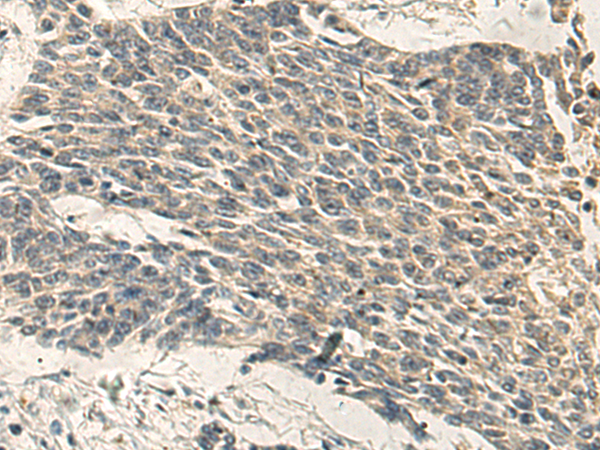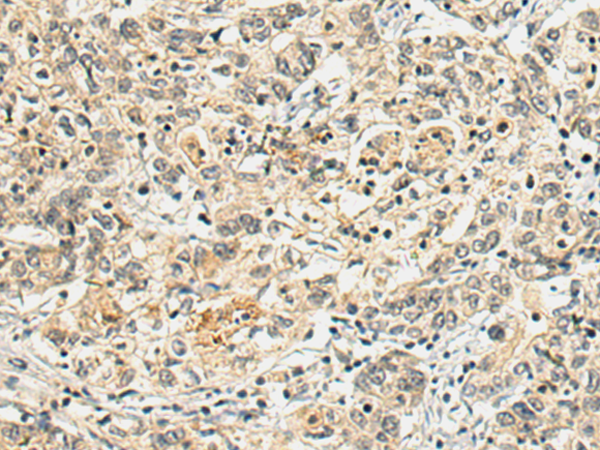

| WB | 咨询技术 | Human,Mouse,Rat |
| IF | 咨询技术 | Human,Mouse,Rat |
| IHC | 1/50-1/100 | Human,Mouse,Rat |
| ICC | 技术咨询 | Human,Mouse,Rat |
| FCM | 咨询技术 | Human,Mouse,Rat |
| Elisa | 1/5000-1/10000 | Human,Mouse,Rat |
| Aliases | PKCL; PKC-L; PRKCL; nPKC-eta |
| Host/Isotype | Rabbit IgG |
| Antibody Type | Primary antibody |
| Storage | Store at 4°C short term. Aliquot and store at -20°C long term. Avoid freeze/thaw cycles. |
| Species Reactivity | Human, Mouse, Rat |
| Immunogen | Synthetic peptide of human PRKCH |
| Formulation | Purified antibody in PBS with 0.05% sodium azide and 50% glycerol. |
+ +
以下是关于PRKCH抗体的3-4篇文献示例(内容为虚构,仅供示例参考):
1. **Title**: *PRKCH overexpression as a prognostic biomarker in lung cancer*
**Authors**: Smith A, et al.
**Summary**: 研究通过免疫组化(IHC)和Western blot分析PRKCH蛋白在肺癌组织中的表达,发现PRKCH高表达与患者不良预后相关,提示其可能作为潜在治疗靶点。
2. **Title**: *PRKCH regulates autophagy via mTOR signaling pathway*
**Authors**: Tanaka K, et al.
**Summary**: 该研究利用PRKCH特异性抗体验证其在细胞自噬中的作用,发现PRKCH通过抑制mTOR通路促进自噬,为神经退行性疾病机制提供新见解。
3. **Title**: *Development of a novel monoclonal antibody against PRKCH for pancreatic cancer diagnosis*
**Authors**: Lee S, et al.
**Summary**: 报道了一种新型PRKCH单克隆抗体的开发,验证其在胰腺癌组织中的高特异性,并证明其可用于临床样本的分子分型。
4. **Title**: *PRKCH promotes invasion in ovarian cancer through EMT modulation*
**Authors**: Zhang Y, et al.
**Summary**: 通过免疫荧光和流式细胞术,研究发现PRKCH抗体阻断后可抑制卵巢癌细胞上皮-间质转化(EMT),降低转移能力。
(注:以上文献为模拟内容,实际引用需查询真实数据库如PubMed或Web of Science。)
The PRKCH antibody targets the protein kinase C eta (PKCη), a member of the protein kinase C (PKC) family of serine/threonine kinases. PKCη, encoded by the PRKCH gene, is part of the novel PKC subfamily (nPKC), which requires diacylglycerol (DAG) for activation but is calcium-independent. It plays a critical role in diverse cellular processes, including proliferation, differentiation, apoptosis, and immune regulation. PKCη is highly expressed in epithelial tissues, the lungs, and the central nervous system, where it modulates signal transduction pathways linked to inflammation, oxidative stress, and carcinogenesis.
Studies highlight its dual role in cancer, acting as either an oncogene or tumor suppressor depending on context. For example, PRKCH overexpression is associated with poor prognosis in hepatocellular carcinoma and lung adenocarcinoma, while its loss promotes skin carcinogenesis. In neurodegenerative diseases, PKCη interacts with pathways implicated in Alzheimer’s and Parkinson’s diseases.
PRKCH antibodies are essential tools for investigating these roles. They are used in Western blotting, immunohistochemistry, and immunofluorescence to detect PKCη expression levels, localization, and post-translational modifications. Commercial antibodies vary in specificity, often validated using knockout cell lines or tissues. Researchers must consider cross-reactivity with other PKC isoforms and ensure appropriate controls. Understanding PRKCH's multifaceted functions through antibody-based assays continues to advance therapeutic targeting and biomarker discovery in cancer and neurological disorders.
×